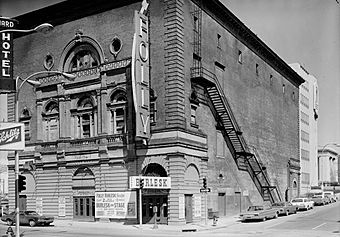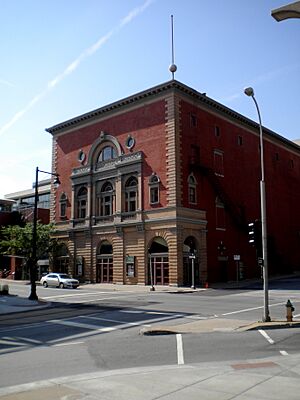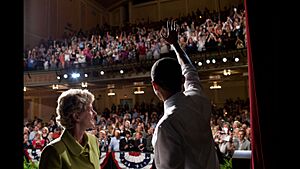Folly Theater facts for kids
Quick facts for kids |
|
|
Standard Theatre (Folly Theater)
|
|

The Folly Theater in 1973 as a burlesque house
|
|
| Location | 300 W. 12th St., Kansas City, Missouri |
|---|---|
| Built | 1900 |
| Architect | Louis S. Curtiss |
| NRHP reference No. | 74001074 |
| Added to NRHP | June 05, 1974 |
The Folly Theater is a historic building in downtown Kansas City, Missouri. It was first called the Standard Theatre. Later, it was also known as the Century Theater and Shubert's Missouri. This theater was built in 1900. It was designed by a Kansas City architect named Louis S. Curtiss. The Folly Theater used to be connected to the Edward Hotel, which was also designed by Curtiss. That hotel was taken down in 1965.


Contents
A Look Back: The Folly Theater's Story
How the Theater Began
The Standard Theatre opened its doors on September 23, 1900. It had 2,400 seats. The theater showed different kinds of live performances, including variety shows. Colonel Edward Butler from St. Louis, Missouri, built it for $250,000. He wanted his son to put on shows there.
In 1901, a fire happened at a nearby theater. Because of this, opera and musical plays moved to the Standard. Famous performers like Sarah Bernhardt and Maude Adams appeared on its stage.
Changing Names and Famous Faces
The theater's name changed to the "Century" in 1902. It continued to host many popular acts. Performers like Al Jolson, Fannie Brice, and Eddie Foy entertained audiences. Besides theater acts, the Century also held boxing and wrestling matches. Famous boxers like Jack Johnson and Jack Dempsey competed there. Jack Johnson even stayed in the manager's apartment because hotels would not rent him a room.
In 1923, the Shubert brothers bought the Century. They made many updates to the building. After the changes, they renamed it "Shubert's Missouri." The Shuberts brought in serious plays, including works by Shakespeare and O'Neill. The Marx Brothers performed their show I'll Say She Is for three weeks in 1923-24. This long run helped convince the Shuberts to keep the theater open.
Tough Times and a New Beginning
After 1928, fewer people came to the theater. It was used for touring shows now and then until it closed in 1932. After some time, it reopened in 1941 as "The Folly." It then showed a different kind of entertainment. Performers like Gypsy Rose Lee appeared there. The Folly closed its doors in January 1974.
In 1974, the theater's owners said they would tear it down. They planned to build a parking lot instead. But a group of people who cared about history wanted to save the theater. Joan Dillon and William N. Deramus III helped form a group called the Performing Arts Foundation. Their goal was to buy and fix up the theater.
The theater was for sale for $950,000. The Performing Arts Foundation raised $350,000. They also convinced the owners to donate the remaining $600,000. In 1974, the Folly was added to the National Register of Historic Places. This helped protect it. A special fundraiser was held, featuring Sally Rand, who had performed at the Folly.
Restoring the Folly
After seven years of hard work, the Folly Theater was fully restored in 1981. A new building was added next to it, where the old Edward Hotel used to be.
In 2000, the Folly celebrated its 100th birthday. A new lobby, restrooms, and a special room for shareholders were added. In 2005, the theater's original colors were brought back in the main seating area. There are also plans to put up a new sign that looks like the Folly's first sign.
The Folly Today
The Performing Arts Foundation of Kansas City runs the Folly Theater. It is a non-profit group. Their goal is to keep Kansas City's oldest historic theater active. They want it to be a top place for performances. The Folly hosts many different events for the community.
The Folly Theater has its own Jazz Series and a Kids Series. It also presents "Cyprus Avenue Live!" shows with artists playing blues, rock, and country music. Other groups also use the Folly. These include the Harriman-Jewell Series for classical music, the Friends of Chamber Music, and the Heartland Men's Chorus.
The Folly Theater's Design
Outside the Building
The Folly Theater's front is made of Carthage limestone and red bricks. It has a special window design in the middle. The lower part of this window has three arched windows. The street level is made of rough limestone with three arched entrances. The building is about 125 feet deep, 70 feet wide, and 65 feet high.
Inside the Building
The inside of the theater uses both steel and wood for its structure. There is a basement under the stage for machines and backstage areas. You enter the main floor through a lobby and a ticket area. The main seating area has three sections of seats facing a beautifully decorated arch. There are also balcony-level boxes on the sides and a main balcony at the back.
The stage has special areas for scenery and ten dressing rooms. The inside decorations are mostly red and gold.
Changes Over Time
The outside of the Folly Theater looks mostly the same as it did when it was built. However, the inside has been changed a lot. In 1923, the lobby was made smaller. The ticket office was moved, and a second ticket office was removed. The balcony and another level were replaced by one larger balcony. This reduced the number of seats. Some of the plasterwork was also changed, and a manager's apartment was removed.
Today, the Folly Theater has 1,078 seats.
 | Laphonza Butler |
 | Daisy Bates |
 | Elizabeth Piper Ensley |



